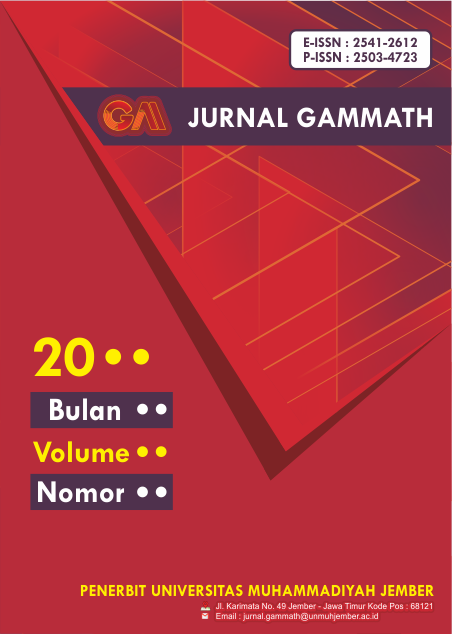Exploring the Role of Desmos in Mathematics Learning: A Quantitative Descriptive Study
Keywords:
desmos, conceptual understanding, learning motivation, student involvementAbstract
This study seeks to investigate the function of the Desmos platform in mathematics education via a quantitative descriptive methodology. The study's subjects were 32 students, evaluated on three principal dimensions: conceptual understanding, learning motivation, and student engagement in mathematics education. Data were gathered through a questionnaire aimed at assessing students' impressions of the efficacy of Desmos in facilitating the learning process. The study's results demonstrate that the utilization of Desmos positively influences all three evaluated dimensions. 50.02% of students concurred, and 38.76 percent strongly concurred that Desmos enhances their conceptual understanding of mathematics. Concerning motivation, 44.4% of students concurred and 36.9% strongly concurred that Desmos augments their motivation to study mathematics. In relation to student engagement, 40.64% of students concurred and 28.14% strongly concurred that the utilization of Desmos enhances their participation in the learning process. This study finds that Desmos significantly enhances conceptual understanding, learning motivation, and student involvement in mathematics education.
References
Carlos, J. (2024). Impact of Digital Learning Tools on Student Engagement in High School Classrooms in Peru. American Journal of Education and Practice, 8(4), 25–35.
Chacón-Prado, M. de J. (2023). Technology Integration in the Classroom: A literature review. Revista Espiga, 22(45), 20–38. https://doi.org/10.22458/RE.V22I45.4598
Chechan, B., Ampadu, E., & Pears, A. (2023). Effect of using Desmos on high school students’ understanding and learning of functions. Eurasia Journal of Mathematics, Science and Technology Education, 19(10). https://doi.org/10.29333/ejmste/13540
Chen, H., & Huang, Y. (2024). The Impact of Digital Learning Platforms on Student Motivation in High School. Journal of Education, Humanities and Social Sciences, 39, 391–395.
Di Pietro, G., & Castaño Muñoz, J. (2025). A meta-analysis on the effect of technology on the achievement of less advantaged students. Computers & Education, 226, 105197. https://doi.org/10.1016/J.COMPEDU.2024.105197
Farmer, J. U. (2024). Plotting for Change: Utilizing Computer-Based Scaffolding through Desmos to Influence High School Students’ Performance and Attitudes toward Mathematics. ProQuest LLC.
Glaze, A., Glaze, A., Moyer-Packenham, P., & Longhurst, M. (2021). Teachers’ Conceptions of Mathematics and the Use of Intelligent Tutoring... Journal of Computers in Mathematics and Science Teaching, 40(3), 201–227.
Hakim, R. N., & Andayani, S. (2024). Study of a mathematics web-based learning on the subject of mean, median and mode. AIP Conference Proceedings, 2622(1). https://doi.org/10.1063/5.0133261
Hidayat, A., & Firmanti, P. (2024). Navigating the tech frontier: a systematic review of technology integration in mathematics education. Cogent Education, 11(1). https://doi.org/10.1080/2331186X.2024.2373559
Madrilejos, L. D. (2024). The Perspectives of Using Desmos for Students’ Conceptual Understanding and Procedural Fluency to Solve Linear Equations. ProQuest LLC.
Nadifah, & Furqan, M. (2024). Impact Of Digital Learning Tools On Student Engagement In Elementary Schools. Proceeding of International Conference on Education, Society and Humanity, 02(2), 446–453. https://doi.org/10.47604/ajep.2521
Poçan, S., Altay, B., & Yaşaroğlu, C. (2023). The Effects of Mobile Technology on Learning Performance and Motivation in Mathematics Education. Education and Information Technologies, 28(1), 683–712. https://doi.org/10.1007/s10639-022-11166-6
Pope, D. (2023). Using Desmos and GeoGebra to Engage Students and Develop Conceptual Understanding of Mathematics. IGI Global. https://doi.org/10.4018/978-1-6684-5920-1.ch006
Rafiq, S., Iqbal, S., & Afzal, A. (2024). The Impact of Digital Tools and Online Learning Platforms on Higher Education Learning Outcomes. Al-Mahdi Research Journal (MRI), 5(4), 359–369.
Ryan, R. M., & Deci, E. L. (2017). Self-Determination Theory: Basic Psychological Needs in Motivation, Development, and Wellness. In New York: Guilford Press. Retrieved from www.guilford.com/p/ryan
Schrader, D. E. (2015). Constructivism and Learning in the Age of Social Media: Changing Minds and Learning Communities. New Directions for Teaching and Learning, 2015(144), 23–35. https://doi.org/10.1002/tl.20160
Vali, I. (2023). The Impact of Technology on Collaborative Learning. Proceedings of the 9th International Conference Education Facing Contemporary World Issues (Edu World 2022), 3-4 June, 2022, University of Pitești, Pitești, Romania, 5, 126–141. https://doi.org/10.15405/epes.23045.13
Downloads
Published
How to Cite
Issue
Section
License
Copyright (c) 2024 Gammath : Jurnal Ilmiah Program Studi Pendidikan Matematika

This work is licensed under a Creative Commons Attribution-NonCommercial 4.0 International License.
















